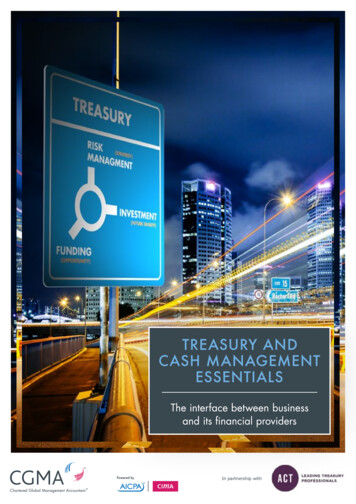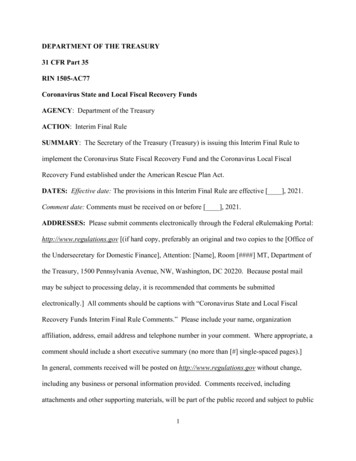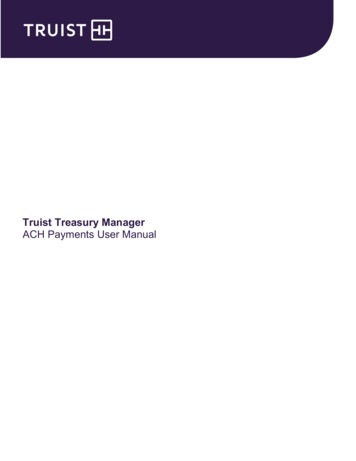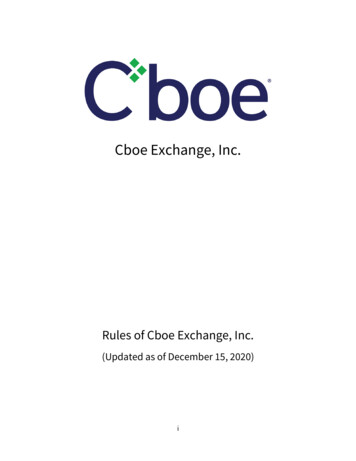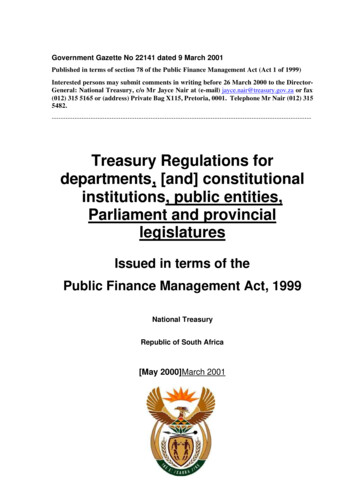
Transcription
Government Gazette No 22141 dated 9 March 2001Published in terms of section 78 of the Public Finance Management Act (Act 1 of 1999)Interested persons may submit comments in writing before 26 March 2000 to the DirectorGeneral: National Treasury, c/o Mr Jayce Nair at (e-mail) jayce.nair@treasury.gov.za or fax(012) 315 5165 or (address) Private Bag X115, Pretoria, 0001. Telephone Mr Nair (012) ---------------------Treasury Regulations fordepartments, [and] constitutionalinstitutions, public entities,Parliament and provinciallegislaturesIssued in terms of thePublic Finance Management Act, 1999National TreasuryRepublic of South Africa[May 2000]March 2001
ContentsPART 1: Definitions, application and date of commencement11.General definitions, application and date of commencement31.11.21.3General definitionsApplicationDate of commencement334PART 2: Management arrangements52.Corporate management72.1Chief financial officer73.Internal control83.13.2Audit committeesInternal controls and internal audit894.Financial misconduct4.14.24.3Investigation of alleged financial misconductCriminal proceedingsReporting10101010PART 3: Planning and Budgeting135.Strategic planning155.15.25.3Date of implementationStrategic plansEvaluation of performance6. Budgeting and related matters6.16.26.36.46.56.6Annual budget circularFormats for Estimates of Expenditure and Departmental RevenueVirementRolloversTransfer of functionsAdditional funds through an adjustments budget15151516161616161717
Treasury Regulations: PFMAPART 4: Revenue and Expenditure Management197.Revenue management217.17.27.3Application of these Treasury RegulationsResponsibility for revenue managementServices rendered by the state2121218.Expenditure management228.18.28.38.48.58.68.7Responsibility of the accounting officerApproval of expenditurePersonnel costsTransfers and grantsCharging of expenditure against a particular vote or main division of a voteCancellation and variation of contractsProcurement222222232424249. Unauthorised, irregular, fruitless and wasteful expenditure259.125GeneralPART 5: Asset and Liability Management2710. Asset management2910.1 Responsibility for asset management10.2 Disposal and letting of assets10.3 Assets accruing to the state by operation of any law29292911. Management of debtors3011.111.211.311.411.53030303030Application of these Treasury RegulationsResponsibility for the management of debtorsRecovery of debts by instalmentsWriting off of debts owing to the stateInterest payable on debts to the state12. Management of losses and GeneralClaims against the state through acts or omissionsClaims by the state against other personsClaims by officials against the stateLosses or damages through criminal acts or omissionsLosses and damages through vis major and other unavoidable causesRecovery of losses and damages13. Loans, guarantees and other commitments3413.1 General13.2 Provinces3434ii
Treasury Regulations: PFMA14. Money and property held in ty for trust money and propertyTrust money must be kept in a trust accountInvestment of trust moneyPART 6: Frameworks3715. Banking, cash management and .1015.1115.12393939404040404041414242Control of the national and provincial revenue fundsBank account configurationDeposits into the revenue fundsResponsibilities of the South African Revenue ServiceResponsibilities of departmentsWithdrawals from and investments in revenue fundsRequisitioning of funds by departmentsSurrender of voted surplus fundsAccounting and reportingBanking and cash managementPrivate money, private bank accounts and cashing private chequesWarrant vouchers, cheques and electronic payments16. Public-private ve competency of accounting officersTreasury approvalFeasibility analysisSubmission to obtain treasury approvalProcurementContracting public-private partnership agreementsManagement of public private partnership agreementsAmendment of public private partnership agreementsCertain agreements not binding on the stateGeneralPART 7: Accounting and reporting4917. Basic accounting records and related issues5117.1 Use of suspense accounts17.2 Availability of financial information17.3 Changes to financial systems51515218. Monthly and annual reports5318.118.218.318.453535455Cash flowMonthly reportsAnnual financial statementsContents of annual reportsiii
Treasury Regulations: PFMA18.5Additional annual reporting requirements for departmentscontrolling trading entities and public entities55PART 8: Miscellaneous5719. Trading 58595959DefinitionsGeneralPolicy and reporting frameworkEstablishmentCapital requirementsDisposal of assetsSurrender of surplus fundsFinancial reporting20. Commissions and Committees of Inquiry6020.1 Definitions20.2 Remuneration of members20.3 Services rendered by members during private time60606021. Gifts, donations and sponsorships6121.121.221.321.461616161Granting of gifts, donations and sponsorships by the stateAcceptance of gifts, donations and sponsorships to the stateGifts or donations of immovable property by or to the stateIdentity of donors and sponsors22. Payments, refunds and remissions as an act of grace6322.1 General6323. Government payroll onsPersal deductionsGranting of deduction codesContravention of regulations and penaltiesTransitional arrangementsPART 9: Public Entities6824. General definitions6824.1 General definitions6825. Application and listing7025.1 Application25.2 Listing7070iv
Treasury Regulations: PFMA26. Responsibilities of designated accounting officer7126.1 Responsibility over Schedule 3A and 3C public entities7127. Internal control and corporate management7227.1 Audit committees27.2 Internal controls and internal audit27.3 Chief financial officers72737328. Annual financial statements7428.1 Financial statements7429. Corporate planning and shareholder’s compacts7529.1 Corporate plans29.2 Shareholder’s compact29.3 Evaluation of performance75767630. Annual budgets and strategic planning7730.1 Annual budgets30.2 Strategic plan30.3 Evaluation of performance77777731. Cash, banking and investment management7831.1 Cash management31.2 Banking framework31.3 Investment policy78787932. Borrowings8032.1 Borrowings8033. Financial misconduct8133.1 Investigation of alleged financial misconduct33.2 Criminal proceedings33.3 Reporting818181v
Treasury Regulations: PFMAvi
PART 1Definitions, [and A]application anddate of commencement1
Part 1: Definitions and application1General definitions, [and] applicationand date of commencement1.1General definitionsIn these Treasury Regulations, unless the context indicates otherwise, a word or expression towhich a meaning has been assigned in the Act, has the same meaning, and –“Act” means the Public Finance Management Act, 1999 (Act No. 1 of 1999 as amended by ActNo. 29 of 1999);“debt” means amounts owing to the state;“division of revenue grants” refers to allocations from the national government to other spheresof government as listed in [Schedules 3A, 3B and 3C of the]schedules to the Annual Division ofRevenue Act, [2000,] including transfers in terms of [section 16 of] that Act;“executive authority” in relation to a constitutional institution means the chairperson of therelevant constitutional institution;“head official of the treasury” refers to the administrative head of the department responsible forfinancial and fiscal matters and which forms part of the relevant treasury;“institution” refers to a department or a constitutional institution;“official” means an employee contemplated in section 1 of the Public Service Act, 1994, read withsection 1 of the Public Service Amendment Act (Act No. 13 of 1996); and includes a magistratecontemplated in section 1 of the Magistrates Act, 1993 (Act No. 90 of 1993) and employees ofconstitutional institutions;[“transfer payments” refer to all transfers excluding–(a) all division of revenue grants from the national government; and(b) any transfers to constitutional institutions and individuals.]1.2Application1.2.1These Treasury Regulations apply–(a) to all departments and constitutional institutions; [and](b) to all public entities listed in Schedules 3A and 3C whose annual budget for its nextfinancial year is less than R100 million, but only to the extent of Chapters 24 to 26,28 and 30 to 33 of these Treasury Regulations;(c) to all public entities listed in Schedules 3A and 3C whose annual budget exceeds orequals R100 million, but only to the extent of Chapters 24 to 28 and 30 to 33 ofthese Treasury Regulations;[b](d) to the South African Revenue Service, but only to the extent as indicated inChapter 15 (paragraph 15.4) and Chapters 24, 25,27,28,30,31,32 and 33;[(i) that it collects and administers state revenue; and]3
Treasury Regulations: PFMA[(ii) as agreed to between it and the National Treasury.](d) to Schedule 2, 3B and 3D public entities but only to the extent as indicated inChapters 25,27,28,29,31,32 and 33(e) to Parliament and the provincial legislatures, but only to the extent as indicated inChapter 15 (paragraphs 15.7 and 15.8) and Chapter 18 (paragraph 18.3).1.2.[2]3 For purposes of paragraph 1.2.1[b](a), the Treasury Regulations that do apply to theSouth African Revenue Services, apply as though it were a department. ItsCommissioner is the accounting officer.[1.2.3These regulations do not apply to Parliament, provincial legislatures and publicentities. ]1.3Date of commencement1.3.1These Treasury Regulations take effect from 1 April 2001, unless otherwise indicated inthe text.4
PART 2Management Arrangements5
Part 2: Management arrangements2Corporate management2.1Chief financial officer2.1.1Unless directed otherwise by the relevant treasury, [the accounting officer of an] eachinstitution must [appoint an official as] have a chief financial officer (CFO) [no laterthan 1 April 2001,] [to] serving[e] on the senior management team of the institution.2.1.2The CFO is directly accountable to the accounting officer.2.1.3Without limiting the right of the accounting officer to assign specific responsibilities, thegeneral responsibility of the CFO is to assist the accounting officer in discharging theduties [under] prescribed in Part 2 of Chapter 5 of the Act and the Annual Division ofRevenue Act. These duties relate to the effective financial management of theinstitution; the exercise of sound budgeting and budgetary control practices; theoperation of internal controls and the timely production of financial reports.7
Treasury Regulations: PFMA3Internal control3.1Audit committees [Sections 76(4)(d) and 77 of the PFMA]3.1.1[The relevant treasury may determine whether departments have shared or nonshared audit committees.] The relevant treasury must inform the Auditor-General by nolater than 1 April 2001 of any determination to share audit committees betweendepartments.3.1.2In the case of a non-shared audit committee, the accounting officer of an institution mustappoint audit committee members in consultation with the relevant executive authority.3.1.3In the case of a shared audit committee, the head of the relevant treasury must appointaudit committee members after consultation with the relevant executive authorities.3.1.4In addition to section 77(a)(iii) of the Act, the chairperson of the audit committee maynot be a political office bearer.3.1.5Audit committees must be constituted so as to ensure their independence.3.1.6Members of an audit committee who have been appointed from outside the public servicepursuant to section 77(a)(i) of the Act, must have proven experience, be appointed oncontract and remunerated in accordance with [ with paragraphs 20.2.2 and 20.2.3 ofthese Treasury Regulations] tariffs as determined by the South African Institute ofChartered Accountants in consultation with the Auditor-General.3.1.7The relevant executive authority has to concur with any pre-mature termination of [the]services of a person serving on the audit committee.3.1.8The audit committee must establish an audit charter to guide the audit approach, as wellas its modus operandi, which should spell out the rules that govern the audit relationship.[3.1.9The audit committee and the accounting officer must facilitate a risk assessment todetermine the material risks to which the institution may be exposed and toevaluate the strategy for managing those risks. The strategy must be used to directaudit effort and priority, and to determine the skills required to manage theserisks.]3.1.[10]9 The audit committee must report and make recommendations to the accounting officer,but the accounting officer retains responsibility for implementing such recommendations.3.1.[11]10 In addition to the above, the audit committee must–(a) evaluate the financial statements of the institution for reasonableness[reasonability] and [accuracy] fair presentation before submission to the AuditorGeneral; [and](b) in the annual report [on] of the institution, comment on:[the effectiveness ofinternal control in the annual report of the institution.](i) the effectiveness of internal control; and(ii) the quality of in year management and monthly reports produced in terms of theAct and the Annual Division of Revenue Act.8
Part 2: Management arrangements3.1.[12]11 Should a report from the internal audit unit (or from any other source) to the auditcommittee implicate the accounting officer in fraud, corruption or gross negligence, thechairperson of the audit committee must promptly report this to the relevant executiveauthority.3.1.[13]12 The audit committee may communicate any concerns it deems necessary to theexecutive authority, the relevant treasury and/or the Auditor-General.3.2Internal controls and internal audit [Sections 38(1)(a)(i) and 76(4)(e) ofthe PFMA]3.2.1The accounting officer must facilitate a risk assessment to determine the material risks towhich the institution may be exposed and to evaluate the strategy for managing thoserisks. Such a strategy must include a fraud prevention plan. The strategy must be used todirect internal audit effort and priority, and to determine the skills required to managethese risks.3.2.[1]2 The accounting officer must provide a certificate to the relevant treasury by 30 June 2001indicating that the risk assessment has been completed and that the fraud prevention planis fully operational. [ensure that a fraud prevention plan is developed no later than31 March 2001.]3.2.[2]3 Accounting officers must establish internal audit units for their institutions in accordancewith the policy determined in terms of paragraph 3.2.4.3.2.[3]4 [The relevant treasury may determine whether departments must have internalaudit units and whether such units must be shared or non-shared units.] Therelevant treasury must inform the Auditor-General by no later than 1 April 2001 of anydetermination to share internal audit units between departments.3.2.[4]5 The internal audit unit may be partly or wholly contracted to an external organisationwith specialist audit expertise, provided that its selection is in accordance with thegovernment’s competitive tendering procedures.3.2.[5]6 Internal audit must be conducted in accordance with the standards set by the Institute ofInternal Auditors.3.2.[6]7 The internal audit unit must prepare, in consultation with and for approval by, the auditcommittee–(a) a rolling three-year strategic internal audit plan based on its assessment of key areasof risk for the institution, having regard to its current operations, those proposed inits strategic plan and its risk management strategy;(b) an annual internal audit plan for the first year of the rolling plan;(c) plans indicating the proposed scope of each audit in the annual internal audit plan;(d) a modus operandi, with management inputs, to guide the audit relationship; and(e) a quarterly report to the audit committee detailing its performance against the plan,to allow effective monitoring and possible intervention.3.2.8The internal audit unit must exercise regular oversight over all transfers received,including transfers in terms of the Annual Division of Revenue Act.3.2.[7]9 The internal audit unit must be independent, with no limitation on its access toinformation.9
Treasury Regulations: PFMA4Financial misconduct4.1Investigation of alleged financial misconduct [Sections 85(1)(b), (c)and (d) of the PFMA and Section 30 of the annual Division of RevenueAct]4.1.1If an official is alleged to have committed financial misconduct, the accounting officer ofthe institution must ensure that disciplinary proceedings are carried out in accordancewith the relevant prescripts.4.1.2The accounting officer must ensure that the investigation is conducted within areasonable period, but no later than 30 days.4.1.3If an accounting officer is alleged to have committed financial misconduct, the relevanttreasury, as soon as it becomes aware of the alleged misconduct, must ensure that theDepartment of Public Service and Administration initiates appropriate disciplinaryproceedings against the accounting officer.4.1.4A treasury may–(a) direct that an official other than an employee of the institution conducts theinvestigation; or(b) issue any reasonable requirement regarding the way in which the investigationshould be performed.4.2Criminal proceedings [Section 86 of the PFMA]4.2.1The accounting officer must advise the executive authority, relevant treasury and theAuditor-General of any criminal charges it has laid against any person in terms of section86 of the Act.4.2.2The relevant treasury may direct an institution to lay charges of criminal financialmisconduct against any person should an accounting officer fail to take appropriateaction.4.3Reporting [Section 85(1)(a) and (e) of the PFMA]4.3.1The accounting officer must, as soon as the disciplinary hearings are completed, report tothe executive authority, the Department of Public Service and Administration and thePublic Service Commission on the outcome, including–(a) the name and rank of the official against whom proceedings are instituted;(b) the disciplinary charges, indicating the financial misconduct the official is alleged tohave committed;(c) the findings of the disciplinary hearing;(d) any sanction imposed on the official; and(e) any further action to be taken against the official, including criminal charges or civilproceedings.10
Part 2: Management arrangements4.3.2The institution must inform the executive authority, the relevant treasury, the Departmentof Public Service and Administration and the Public Service Commission of the outcomeof any criminal proceedings instituted against any person for financial misconduct interms of section 86 of the Act.4.3.3The accounting officer must, on an annual basis, submit to the provincial treasury (ifapplicable), [national] National Treasury and Auditor-General a schedule of–(a) the name and rank of officials facing disciplinary hearings or criminal charges;(b) the outcome of any disciplinary hearings and/or criminal charges; and(c) the sanctions and any further action taken against the relevant official;Such a report must refer to any changes to the institution’s systems of financial and riskmanagement or any other matter dealt with in the Act, as a result of the investigation.11
PART 3Planning and Budgeting13
Part 3: Planning and budgeting5Strategic planning5.1Date of implementation5.1.1This chapter takes effect from 1 April 2002. The first date for submission of strategicplans is 30 June 2001 for the MTEF period commencing 1 April 2002. Quarterly reportson performance take effect from 30 June 2002, starting with a report on the first quarterof the 2002/03 financial year.5.2Strategic plans5.2.1The accounting officer of an institution must prepare a strategic plan for the forthcomingMedium Term Expenditure Framework (MTEF) period, for approval by the relevantexecutive authority.5.2.2The approved strategic plan must be forwarded to the relevant treasury no later than30 June each year.5.2.3The strategic plan must–(a) cover a period of three years and be consistent with the institution’s input to theMTEF;(b) include the programme objectives and outcomes identified by the executiveauthority, as well as the Service Delivery Improvement Programme;(c) include the multi-year projections of revenue and expenditure for the forthcomingbudget;(d) include the key performance measures and key indicators of the Service DeliveryImprovement Programme for assessing the institution’s performance in deliveringthe desired outcomes and objectives;(e) be updated annually on a rolling basis, including any adjustments to theorganisational structure;(f) for departments, include the requirements of Chapter 1, Part III B of the PublicService Regulations, [1999] 2001; and(g) form the basis for the annual reports of accounting officers in terms of section40(1)(d) and (e) of the Act.5.3Evaluation of performance [Section 27(4) read with 36(5) of the PFMA]5.3.1The accounting officer of an institution must establish procedures for quarterly reportingto facilitate effective performance monitoring, evaluation and corrective action.5.3.2The accounting officer must issue quarterly reports to the executive authority no laterthan 15 days after the end of each quarter.15
Treasury Regulations: PFMA6Budgeting and related matters6.1Annual budget circular6.1.1The accounting officer of a department must comply with any annual budget circularsissued by the relevant treasury. Budget circulars issued by provincial treasuries must beconsistent with any budget circular issued by the [national] National Treasury toprovincial treasuries.6.1.2The accounting officer of a constitutional institution must submit all submissions for abudget via the accounting officer of the department transferring funds to thatconstitutional institution.6.1.3The accounting officer of a department must ensure that all budget submissions ofconstitutional institutions and any public entities receiving transfers via the department,are included in his/her department’s budget submission. [unless exempted by therelevant treasury.]6.2Formats for Estimates of Expenditure and Departmental Revenue[Section 27(3) of the PFMA]6.2.1The Estimates of Expenditure and Departmental Revenue presented to Parliament or aprovincial legislature must conform to the formats determined by the [national] NationalTreasury.6.3Virement [Section [44] 43 of the PFMA]6.3.1For purposes of section 43(1) of the Act–(a) personnel expenditure and transfers by departments may not be increased without[prior] approval of the relevant treasury; and(b) allocations earmarked by the relevant treasury for a specific purpose may not beused for other purposes except with the relevant treasury’s approval.6.4Rollovers [Sections 30(2)(g) and 31(2)(g) of the PFMA]6.4.1Funds appropriated but not spent in a particular financial year may be rolled over to asubsequent year subject to the following conditions or limitations–(a) Capital expenditure: Unspent funds on capital expenditure may only be rolled overto finalise projects still in progress or for other capital purposes.(b) Transfer payments: Savings on transfer payments may not be rolled over forpurposes other than originally voted for.(c) Current expenditure: A maximum of five per cent of a department’s currentexpenditure in the main estimate of expenditure may be rolled over.6.4.2Requests for rollovers must be submitted to the relevant treasury on or before the lastworking day of May each year, in a format determined by the [national] NationalTreasury.16
Part 3: Planning and budgeting6.4.3All requests for rollovers must include:(a)(b)(c)the reasons for the under spending;commitments that the funds rolled over will be spent;an assessment of the spending capacity taking into consideration the newbudget allocation and the rolled over funds.6.4.[3]4 The relevant treasury may deny all or part of a request for a rollover [if this request doesnot conform to the arrangements in paragraphs 6.4.1 and 6.4.2 or] if circumstanceswarrant such a denial.6.5Transfer of functions [Section 42 of the PFMA and Section 27 of DORA]6.5.1Where a function is to be transferred by a department during a financial year, the relevanttreasury must be consulted in advance, to facilitate any request for the resulting transferof funds voted for that function in terms of section 33 of the Act.6.5.2Should the Minister of Public Service and Administration or a Premier of a provincemake a determination regarding the transfer of a function in terms of the Public ServiceAct, 1994, that determination must accompany a request for the transfer of funds as perparagraph 6.5.1. Should the Minister of Public Service and Administration or a Premierapprove a function transfer after the finalisation of the adjustments estimates, it must bedealt with on a recoverable basis.6.5.3Before seeking formal approval from the Minister of Public Service and Administrationor the Premier of a province for any transfer of functions to another sphere ofgovernment, the transferring accounting officer must first seek the approval of therelevant treasury on any funding arrangements.6.5.4Transfer of functions to municipalities must be dealt with in terms of the AnnualDivision of Revenue Act.6.6Additional funds through an adjustments budget [Sections 30(2)(b)and 31(2)(b) of the PFMA]6.6.1For purposes of an adjustments budget, the following will not be consideredunforeseeable and unavoidable expenditure–(a) expenditure that, although known when finalising the estimates of expenditure,could not be accommodated within allocations;(b) tariff adjustments and price increases; and(c) extensions of existing services and the creation of new services that are notunforeseeable and unavoidable.6.6.2The department requesting additional funds through an adjustments budget must submit amemorandum to the relevant treasury, the Cabinet/EXCO Secretariat and any treasurysubcommittee of the Cabinet/EXCO, on a date determined by the relevant treasury, butby no later than 15 September.17
PART 4Revenue and ExpenditureManagement19
Part 4: Revenue and expenditure management7Revenue management7.1Application of these Treasury Regulations7.1.1The Treasury Regulations in this chapter apply to the identification, collection, recordingand safeguarding of all revenue for which an institution is responsible.7.2Responsibility for revenue management7.2.1The accounting officer of an institution must manage revenue efficiently and effectivelyby developing and implementing appropriate processes that provide for the identification,collection, safeguarding, recording and reconciliation of information about revenue.7.3Services rendered by the state7.3.1The accounting officer of an institution must review, at least annually when finalising thebudget, all fees, charges or the rates, scales or tariffs of fees and charges that are not, orcannot, be fixed by any law and that relate to revenue accruing to a revenue fund. Theaccounting officer must obtain approval from the relevant treasury for the proposed tariffstructure.7.3.2Information on the tariff [policy] structure must be disclosed in the annual report,including information on any free service(s) rendered, but not taken into account in thebudget and which could have yielded significant revenue.21
Treasury Regulations: PFMA8Expenditure management8.1Responsibility of the accounting officer [Section 76(4)(b) of the PFMA]8.1.1The accounting officer of an institution must ensure that internal procedures and internalcontrol measures are in place for payment approval and processing.8.2Approval of expenditure [Section 38(1)(f) and 76(4)(b) of the PFMA]8.2.1An official of an institution may not spend or commit public money except with theapproval (either in writing or by duly authorised electronic means) of a properlydelegated or authorised officer.8.2.2Before approving expenditure or incurring a commitment to spend, the delegated orauthorised official must ensure that any limitations or conditions attached to thedelegation or authorisation are complied with.8.2.3Unless determined otherwise in a contract or other agreement, all payments due tocreditors must be settled within 30 days from the date of a statement which reflects allinvoices, payments and credits and, in the case of civil claims, from the date ofsettlement or court judgement.8.2.4Where creditors have not been settled within the period prescribed in paragraph 8.2.3, areport must be forwarded to the EXCO and to the relevant treasury stating reasons for thenon-compliance.8.3Personnel costs [Section 76(4)(b) of the PFMA]8.3.1Activities relating to the authorisation of appointments, the authorisation of paymentsand the recording of those payments may not be performed by the same person.8.3.2The accounting officer of an institution must ensure that the personnel cost of allappointees, as well as promotion and salary increases, can be met within the budgetaryallocation of the institution.8.3.3Unless otherwise determined by the [national] National Treasury, personnel are dividedinto the following groups for the payment of salaries–(a) Group A: Persons who must be paid on the 15th day of the month, or if it is not aworking day, on the last working day preceding the 15th. These include–(i) persons appointed permanently on the fixed establishment and employed interms of the Public Service Act, 1994; and(ii) persons appointed on contract.(b) Group B: This group represents personnel paid on the last working day of the monthand includes temporary and part-time staff, and pe
Treasury Regulations: PFMA ii PART 4: Revenue and Expenditure Management 19 7. Revenue management 21 7.1 Application of these Treasury Regulations 21 7.2 Responsibility for revenue management 21







